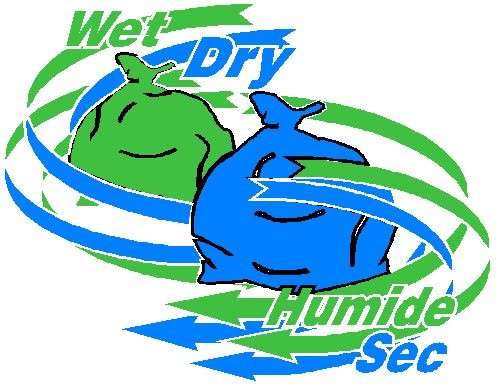To: Maria McRae, Chair, City of Ottawa Environment Committee
CC: Scott Moffatt
I hope some of the ideas I have brought to your attention strike a chord with your sensibilities and that your committee decides to study the feasibility of a Wet/Dry program in Ottawa.
CC: Scott Moffatt
Jim Watson (Mayor, ex-officio)
Dear Environment Committee Members,
I am writing you today in suggestion of a waste management strategy the City could enact as a means to achieve environmental and financial sustainability. I offer New Brunswick’s Wet/Dry waste management scheme and discuss its applicability to Ottawa.
New Brunswick’s largest metropolitan area, the Greater Moncton Area (GMA pop ~140, 000), introduced voluntary Wet/Dry waste separation in 1999 and required citizen’s participation in 2006. More than 51% of residential waste collected is recycled or composted; meanwhile, Ottawa’s solid waste diversion rate sits well below Moncton and just under the Ontario median of 36.8% at 32.3%.
The Wet/Dry program’s success is in its simplicity; residents use two transparent garbage bags, blue for dry and green for wet. Dry waste includes all refuse that is not wet or soiled, items that can be easily rinsed or wiped clean, recyclables and non-recyclables, all types of paper, cardboard, bottles, cans, etc. Wet waste includes all food items, soiled food wrappers, hygiene products, yard waste, tissues and paper towels, as well as any other soiled item that would contaminate the recyclables. Household hazardous wastes (batteries, paint cans, etc.) are collected at regular intervals during the waste collection schedule or any time at drop-off centre, and a sorting facility diverts recyclables and separates compostable waste from what will enter a landfill.
The principal benefit of the Wet/Dry program is that citizens’ responsibility to properly and consistently separate waste is mostly taken up by staffed sorting facilities.This shift would help the City’s bottom line by stabilizing the supply of waste diversion products (compost soil and recycled materials), a problem that has dogged the Green Bin program in Ottawa. Additionally, the Wet/Dry approach creates permanent low-skill jobs.
Dear Environment Committee Members,
I am writing you today in suggestion of a waste management strategy the City could enact as a means to achieve environmental and financial sustainability. I offer New Brunswick’s Wet/Dry waste management scheme and discuss its applicability to Ottawa.
New Brunswick’s largest metropolitan area, the Greater Moncton Area (GMA pop ~140, 000), introduced voluntary Wet/Dry waste separation in 1999 and required citizen’s participation in 2006. More than 51% of residential waste collected is recycled or composted; meanwhile, Ottawa’s solid waste diversion rate sits well below Moncton and just under the Ontario median of 36.8% at 32.3%.
The Wet/Dry program’s success is in its simplicity; residents use two transparent garbage bags, blue for dry and green for wet. Dry waste includes all refuse that is not wet or soiled, items that can be easily rinsed or wiped clean, recyclables and non-recyclables, all types of paper, cardboard, bottles, cans, etc. Wet waste includes all food items, soiled food wrappers, hygiene products, yard waste, tissues and paper towels, as well as any other soiled item that would contaminate the recyclables. Household hazardous wastes (batteries, paint cans, etc.) are collected at regular intervals during the waste collection schedule or any time at drop-off centre, and a sorting facility diverts recyclables and separates compostable waste from what will enter a landfill.
The principal benefit of the Wet/Dry program is that citizens’ responsibility to properly and consistently separate waste is mostly taken up by staffed sorting facilities.This shift would help the City’s bottom line by stabilizing the supply of waste diversion products (compost soil and recycled materials), a problem that has dogged the Green Bin program in Ottawa. Additionally, the Wet/Dry approach creates permanent low-skill jobs.
The GMA Wet/Dry program provides more than 70 jobs for the local economy and recovers and sends over 30 different products to recycling markets.
I hope some of the ideas I have brought to your attention strike a chord with your sensibilities and that your committee decides to study the feasibility of a Wet/Dry program in Ottawa.
Sincerely,
D$$
